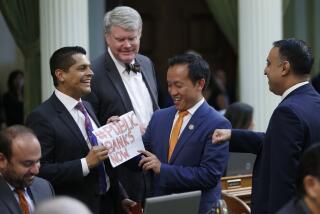Critics Imperil First Interstate’s Foray Into Texas : Foes Put Pressure on Bank to Offer More Loans to Minorities
First Interstate Bancorp’s proposed acquisition of a Texas bank could be delayed or derailed by opposition from civil rights and community organizations demanding that the California institution increase its lending within low-income neighborhoods and to minorities.
Adopting an increasingly popular tactic, the groups filed documents with the Federal Reserve Bank in San Francisco opposing the acquisition and accusing First Interstate of discriminatory lending practices.
Paul D. Minch, a senior vice president at First Interstate, denied the discrimination charges and said that First Interstate banks have met federal fair-lending guidelines. Minch said the bank is involved in talks with the opponents to try to resolve the issue.
First Interstate announced May 21 that it had agreed to acquire Allied Bancshares of Houston, which has assets of $9.9 billion. If approved by the Fed, the merger would be the first foray into Texas by the Los Angeles-based bank holding company and would be its largest acquisition.
Could Delay Deal
If the problem is not resolved in talks being mediated by the Fed, a public hearing would be required. While it is viewed as unlikely that a hearing would result in rejection of the acquisition, the process could delay the deal for months.
Talks with one of the groups broke down last week when representatives of the Fresno Organizing Project walked out of a meeting, claiming that First Interstate was not negotiating in good faith.
The opposition represents the first serious challenge to an acquisition attempt by a California bank in recent years, according to a Fed spokesman. However, similar tactics have been employed in recent years against savings and loan firms in the state.
The technique of intervening in bank mergers to seek increased lending to minorities and the poor has gained popularity across the country as the pace of bank mergers has risen.
“These groups are becoming more active in protesting practically every application by a financial institution to merge or expand,” said Ron Supinski, manager of public and media relations for the Federal Reserve Bank in San Francisco. “It seems to indicate that, if they can’t kill a merger, they can delay it. We regard all the protests as bona fide and have to determine the truth of the allegations, and that takes time.”
The protests are filed under the Community Reinvestment Act of 1977, federal legislation that requires a financial institution to meet the deposit and credit needs of the community in which it is located. Regulators must consider an institution’s compliance record when deciding on a merger.
Nine letters of opposition to the First Interstate acquisition have been filed with the Fed. In addition to some individuals and the Fresno Organizing Project, opposition has come from the Pomona Valley branch of the NAACP, which represents 12 cities east of Los Angeles, and the Assn. of Community Organizations for Reform Now (ACORN), a national group.
Loan Data Cited
Harold Webb, president of the NAACP branch, said his organization wants First Interstate to commit $15 million in loans to predominantly black neighborhoods in Pomona. He said loan data during the past six years showed that First Interstate had made only two home improvement loans, valued at a total of $20,000, in a Pomona census tract where the population is two-thirds black. In a largely white area nearby, he said, the bank had made 10 loans worth $200,000.
In recent years, four big Chicago banks have reached agreements to pump more than $100 million into low- and moderate-income neighborhoods to calm protests and allow mergers or expansions to proceed. Some bankers have been surprised to find that the programs have opened up hearty new loan markets.
One example is First National Bank of Chicago, which committed millions of dollars to the program at a time when it was acquiring American National Bank.
The four banks formed a consortium with a nonprofit group and have loaned more than $100 million under the program without a single loan loss, said Richard C. Hartnack, a senior vice president at First Chicago. The success has led First National to expand its small business and real estate lending in the neighborhoods, independent of the program, he said.
More to Read
Inside the business of entertainment
The Wide Shot brings you news, analysis and insights on everything from streaming wars to production — and what it all means for the future.
You may occasionally receive promotional content from the Los Angeles Times.










